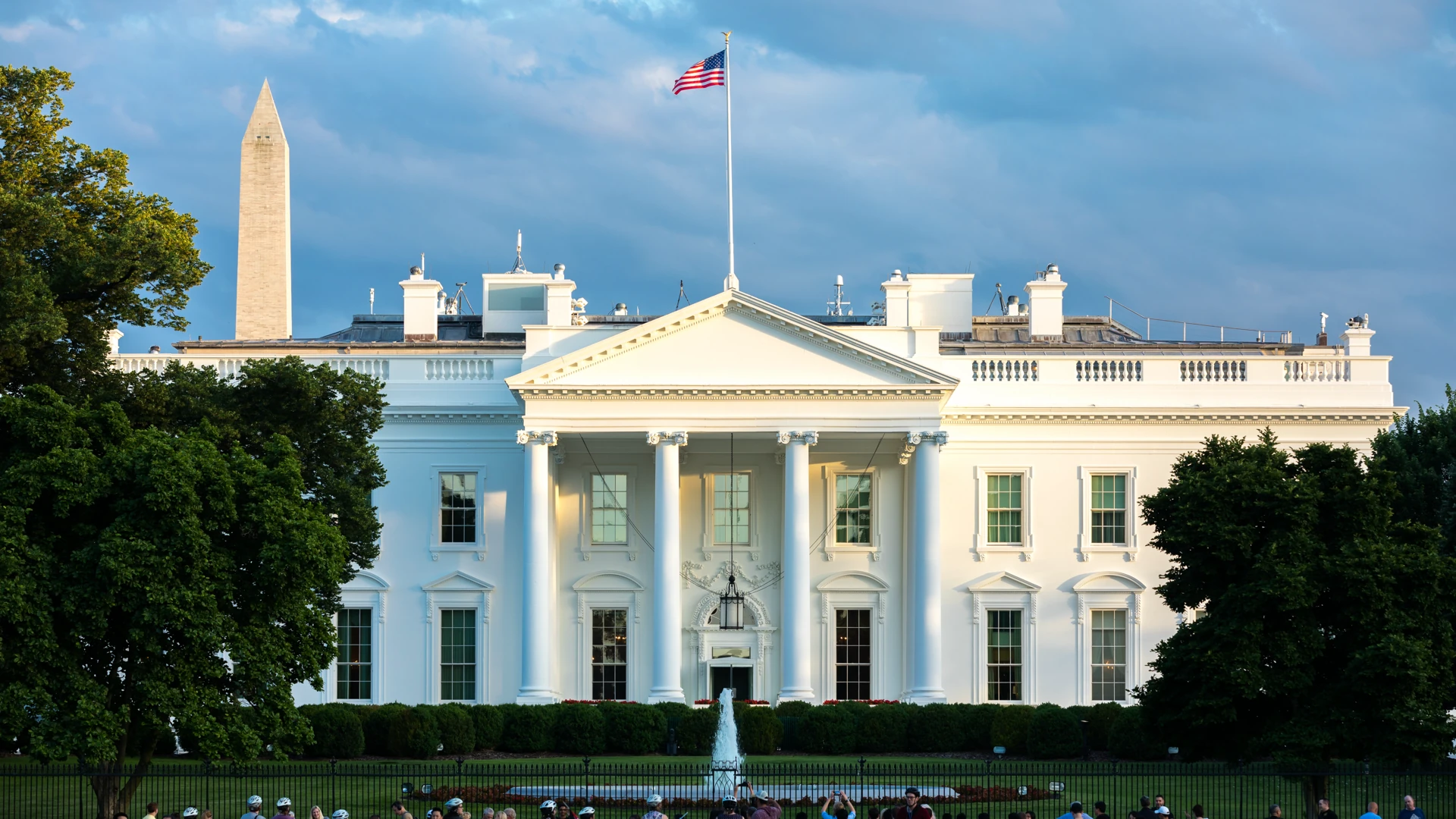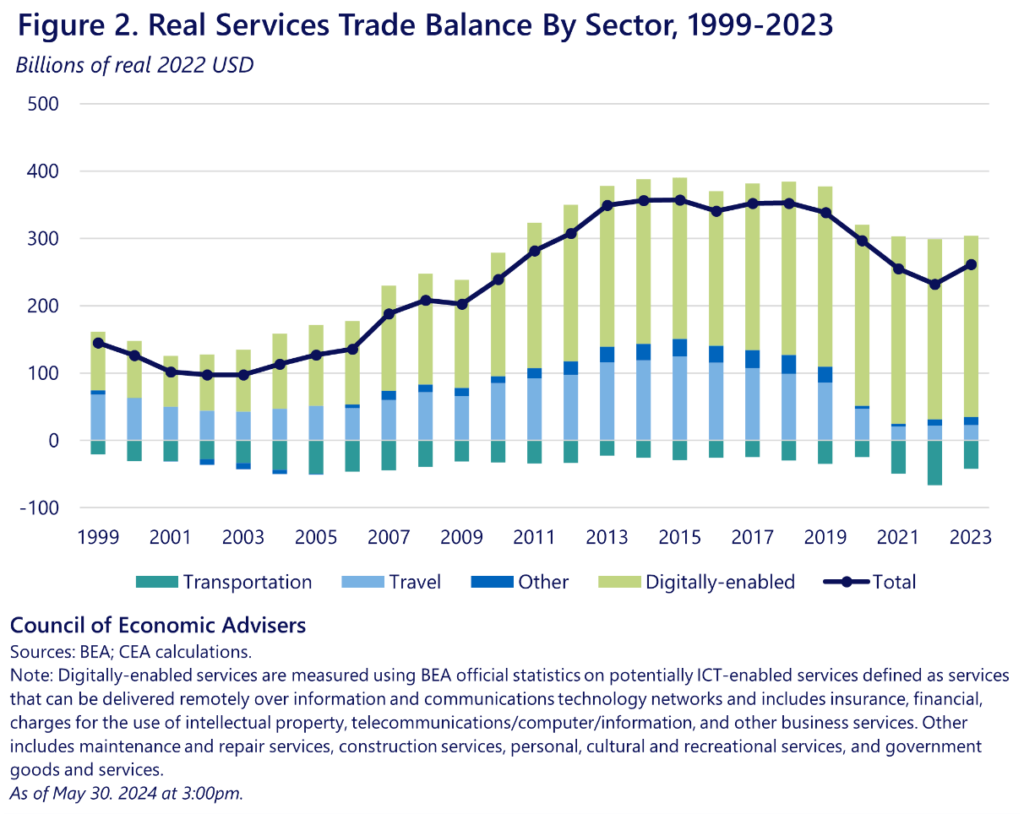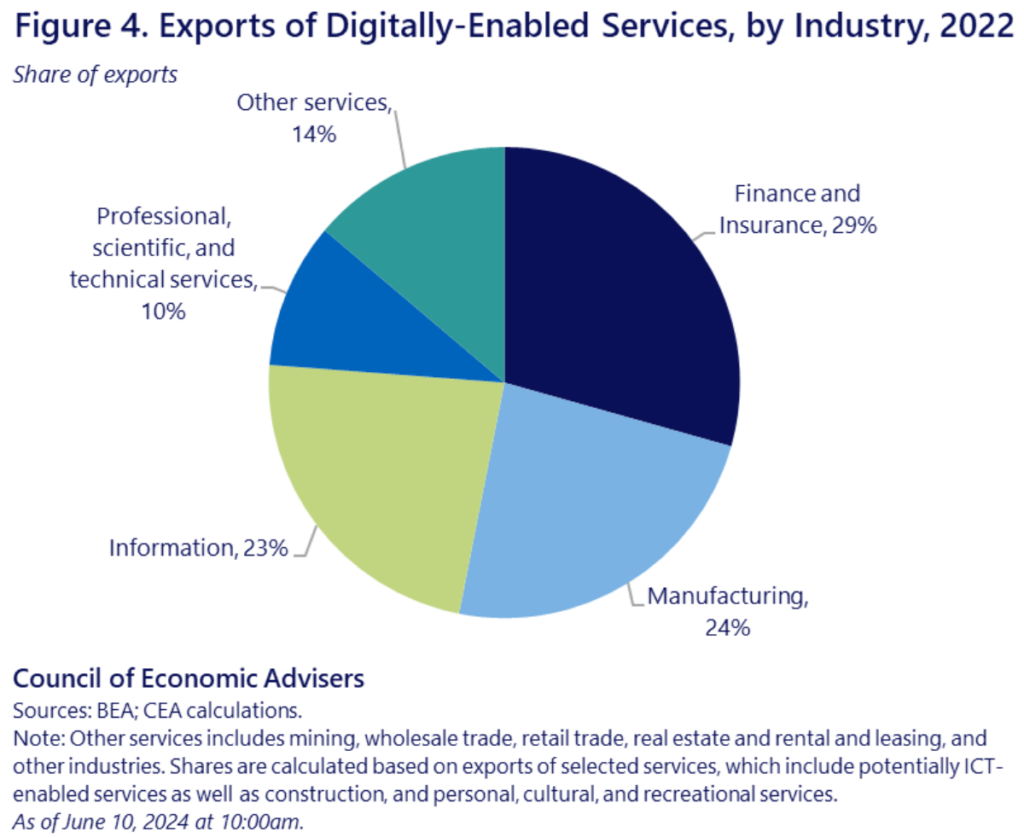
Out of the haze of confusing and conflicting messages on trade, almost entirely neglecting U.S. interests in foreign markets, we now have at least one clear voice of reason from the President’s economic advisory bodies.
Promoting the export of digital services is essential to the interests of the United States government and should be made a top priority to benefit the U.S. economy, U.S. industry across all sectors, and workers. This is the clear message that was communicated to the White House from key advisors this month, as it becomes increasingly clear that U.S. trade policy is failing to complement its broader domestic initiatives. An urgent rethink of the current U.S. digital trade trajectory is needed to align the U.S. government approach to assuring economic resilience, growth, and innovation, as it becomes clear U.S. global economic policy is not working in tandem with its domestic policies.
The guidelines underscoring the importance of digital services exports came from the President’s Export Council and the Council of Economic Advisers, both of which released reports calling for expanded U.S. action in the digital trade space.
The Bottom Line: Digital Services Exports Are Critical to U.S. Economic Interests
On June 10, the Council of Economic Advisers (CEA) released a report detailing how the strength of U.S. services exports are propelled by digital services exports, a phenomenon that I covered previously. Building on the CEA’s missive, the President’s Export Council (PEC) sent the White House recommendations on June 11 for policies that would maximize the positive impacts of trade policy for the United States.
The CEA concluded that, to foster the United States’ position as “poised to lead the growth in intangible flows given that the digitally-enabled services sector is one of the highest-paying and innovative segments of the economy,” the U.S. government will need “careful consideration” of digital trade restrictive policies abroad.
Meanwhile, the PEC recommended that the Administration “re-establish U.S. leadership on digital services trade globally” to protect the “virtuous cycle (success of service exports overseas and job growth at home) [that] is increasingly at risk by the ongoing rise of market access restrictions and discriminatory rules targeting digital services in markets around the world.” The PEC gave tangible directives for the Administration to pursue rules focused on cross border data flows, data localization, source code, the treatment of content, and a permanent moratorium on the imposition of customs duties on electronic transmissions. It recommends a multi-pronged approach, reasserting U.S. leadership at the World Trade Organization, the Indo-Pacific Economic Framework, (possibly) the Comprehensive and Progressive Agreement for Trans-Pacific Partnership, the Americas Partnership for Economic Prosperity, the G7, the G20, and the Organisation for Economic Co-operation and Development. The Council further urges enforcement of existing trade agreements in services, to pursue international standards development and transnational regulatory harmonization to ensure certainty for U.S. exporters.
The need for reinvigorated U.S. leadership on digital services export promotion is a necessity given the importance of these services to the U.S. economy, as both the CEA report and the PEC recommendations detail.
The CEA report notes that since the late 2000s, “the services trade surplus has been fueled primarily by the growth in digitally-enabled services” and that the “growth in U.S. digitally-enabled services exports has far outpaced the growth in exports of other services as well as exports of goods over the last 25 years.” CEA observes that the trend “comports with the expansion of the U.S. digital economy”—the report notes that in 2022, “while U.S. real GDP grew by 1.9 percent, the U.S. digital economy real value added grew by 6.3 percent driven primarily by growth in software and telecommunication services.” Further, the report finds that while growth of non-digital services has been essentially flat since 1999, digital services exports have grown four times as much and at double the rate of U.S. goods exports over the same period.

Source: Council of Economic Advisers
These recommendations and policy guidelines echo what digital exporters have long been reporting, but it is important to note that they are coming from experts and advisers from a wide range of backgrounds. The CEA is led by Jared Bernstein, a well-known economist that has worked in the Department of Labor and the Congressional Budget Office. The PEC is made up of leaders from a wide range of industries including the airline, food, automotive, telecommunications, shipping, financial, entertainment, and healthcare sectors. Importantly, the Council also includes representatives from unions, an academic, Keisha Lance Bottoms (the former Mayor of Atlanta), and Lisa Disbrow (the former Under Secretary of the Air Force).
This broad-based support for digital services export promotion is reflective of the fact that they are essential not just to other services sectors—the majority of which rely on digital services to reach foreign markets and thrive there—but also U.S. manufacturing. Increasing U.S. manufacturing capacity is a key pillar of the Biden Administration’s goals to strengthen the domestic production of semiconductors, pharmaceuticals, critical materials, electric vehicles, and more. As the CEA argues: “The role of U.S. manufactures as major exporters of digitally-enabled services provides a strong foundation to achieve the Administration’s commitment to build a thriving advanced manufacturing sector… Investments in advanced manufacturing—a sector that produces and exports both technologically complex goods and intellectual property embedded in patents, industrial processes, trademarks, software licenses, etc.—will continue supporting the U.S. comparative advantage in services.”

Source: Council of Economic Advisers
Recommendations from White House Economic Advisers Reflects Consensus Currently Largely Absent from U.S. Trade Policy
These pleas to re-center digital trade as a priority of economic policy follow similar advocacy from the State Department in its May release of the “International Cyberspace and Digital Policy Strategy,” which highlighted how promoting U.S. digital services operations abroad by addressing market access barriers can further goals of diplomacy and human rights globally. The State Department debuted the idea of “digital solidarity” in this report and has since worked to socialize it through public events—a concept meant to offer a positive alternative to the dressed-up form of protectionism articulated as “digital sovereignty” that is accelerating the fragmentation of the open internet.
The Commerce Department, as well, has led on this effort recently, securing commitments in the last few months to promote policy harmonization for the cross-border delivery of digital services with Kenya (with a focus on cross-border data flows) and Singapore (with a focus on harmonizing approaches to artificial intelligence).
So, key White House economic counselors, the State Department, and the Commerce Department are on the same page that U.S. leadership in digital trade to expand the reach of U.S. digital services should be a central aspect of economic and foreign policy.
It is unfortunate, then, that the agency with the statutory obligation to lead on U.S. trade policy—the U.S. Trade Representative (USTR)—has largely retreated from this mission in the digital economy space. USTR has withdrawn support for the strong digital trade commitments that would catalyze and protect U.S. digital services exports—the very approach recommended and favored by so much of the rest of the Biden Administration. This has been reflected by problematic policy reversals on rules protecting cross-border data flows, prohibiting unjust data localization, and shielding companies’ source code from forced disclosure through initiatives at the World Trade Organization (WTO) and the Indo-Pacific Economic Framework (IPEF).
The argument from USTR and opponents of digital trade commitments is that there is a need for “policy space” for domestic regulation in the digital realm in privacy, AI, and labor. The PEC recommendations dispel this notion, highlighting how the “right to regulate is firmly enshrined in bilateral, regional, and multilateral trade agreements” and that the United States is being left behind as trading partners have “been able to create and maintain strong privacy, consumer protection, competition and other public policy prerogatives while negotiating digital market access and national treatment disciplines.” CCIA has covered this phenomenon as well.
Further, digital trade actually benefits labor interests—both the PEC and the CEA detail how expanding digital services exports leads to gains for workers. The PEC recommendations note that the “removal of market access restrictions and discriminatory regulations for services leads to added American jobs and a positive impact on the U.S. trade deficit” and that when access to the rest of the world is cut off through barriers to operating, “U.S. firms are cut off from the 95% of consumers that reside outside the United States, losing markets to other trading partners who have secured such access through trade commitments.” Meanwhile, the CEA chronicles the high-paying nature of the digital services sector where, in 2022, the “average weekly wage of workers in digitally-enabled services industries was the highest ($2,195) compared to the economy average ($1,650).”
The Administration must organize a reworking of its trade stance. So far, despite its closest economic advisers counseling of the benefits of digital trade to the United States, this Administration’s USTR has declined to pursue the policies that would be needed to realize the benefits of digital trade highlighted for U.S. industry, workers, and global diplomatic efforts. This has directly contradicted the approach taken by the State Department, the Commerce Department, and the White House. Going forward, for the United States to speak with a single voice in pursuing a harmonized strategy to achieve its economic goals, this must change. USTR must pivot to seeking new agreements with strong digital trade commitments while ensuring that countries that are discriminating against U.S. digital services providers in violation of agreements with the United States are dissuaded from doing so—either through enforcement actions or robust bilateral engagement.
